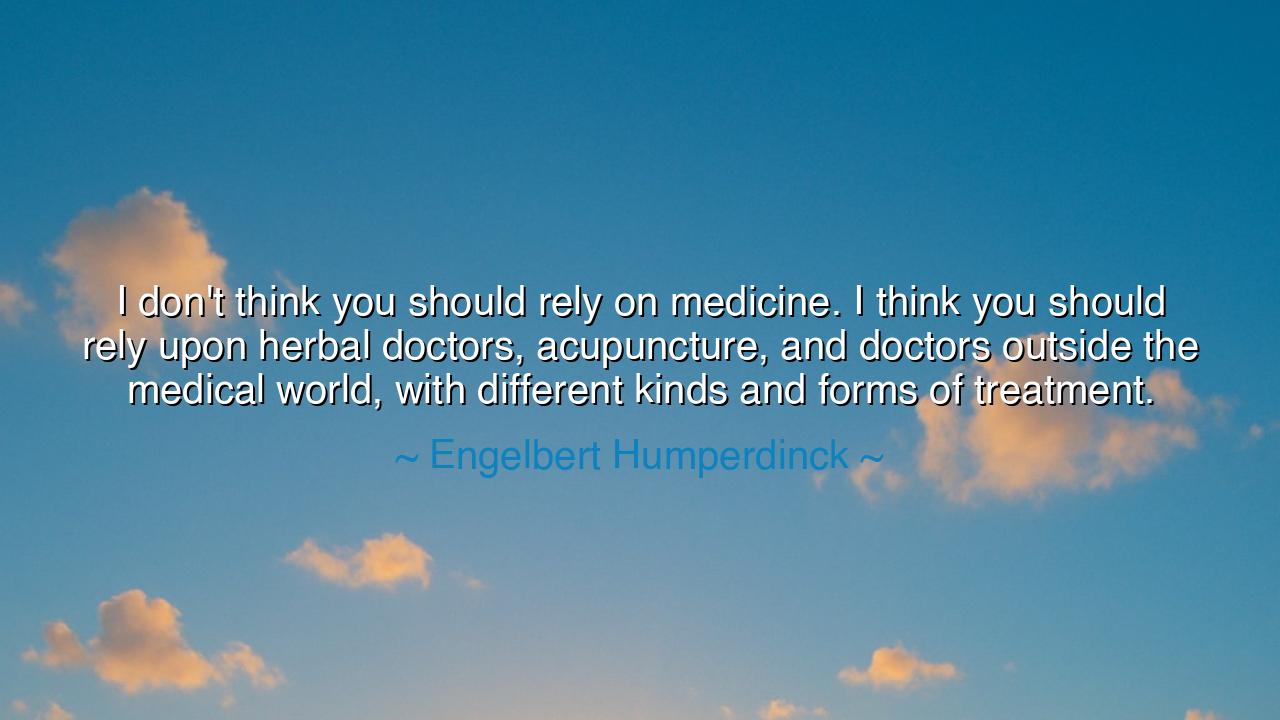
I don't think you should rely on medicine. I think you should
I don't think you should rely on medicine. I think you should rely upon herbal doctors, acupuncture, and doctors outside the medical world, with different kinds and forms of treatment.






The words of Engelbert Humperdinck rise like a voice from the crossroads between science and spirit: “I don't think you should rely on medicine. I think you should rely upon herbal doctors, acupuncture, and doctors outside the medical world, with different kinds and forms of treatment.” Though spoken in an age of machines and laboratories, these words recall the ancient ways of healing, when man sought balance not only through the body, but through the soul, the earth, and the unseen currents of life. His message is not rebellion against science, but a yearning—a call to remember that health is not merely the absence of disease, but the harmony of the whole being.
In the oldest traditions, before hospitals and microscopes, healing was an art of the spirit as much as of the flesh. The herbalists, the healers, and the acupuncturists of old understood that the body is a living garden, not a machine of parts. They listened not only to the pulse of blood but to the rhythm of nature itself. They saw sickness as imbalance, and healing as the restoration of harmony between the self and the world. Humperdinck’s words echo this ancient wisdom—that there are forms of treatment beyond the pill and the scalpel, forms that reach deeper into the roots of being.
To rely upon herbal doctors is to trust the quiet medicine of the earth: the leaf, the flower, the root that draws power from sun and soil. For long before laboratories, nature was the first apothecary. From the willow tree came aspirin, from the foxglove, the heart’s medicine, and from countless herbs, the healing of wounds and fevers. Those who dismiss herbal medicine forget that modern drugs themselves were born from the study of the wild. What Humperdinck reminds us is not to abandon science, but to remember its origin—to honor the source from which all knowledge flows.
And consider acupuncture, the ancient craft of the East, which speaks of energy unseen—the chi, the life-force that flows through the body’s channels as rivers through the land. Though invisible, its wisdom has endured for thousands of years, healing without cutting, balancing without breaking. Even modern science, once skeptical, now sees its value, recognizing that what was once called chi may indeed reflect the body’s nervous and circulatory harmonies. Thus, Humperdinck’s belief in such different forms of treatment is not folly—it is faith in the wisdom that predates and underlies modern discovery.
There is a story from China, many centuries ago, of a physician named Bian Que, known as the “Doctor of Spirits.” He healed kings not through drugs, but through understanding their emotions, their diets, and their dreams. When asked how he could treat illness before it appeared, he said, “The best doctor prevents the disease.” So it was that he became legend, for he healed by balance rather than by battle. This tale stands as a mirror to Humperdinck’s philosophy—that true healing is not only about treating pain, but about nurturing life itself, before pain ever comes.
Yet, let us not misunderstand his message. He does not reject medicine, but warns against reliance—that blind dependence which turns man from a participant in his own healing into a passive subject of it. He calls us to seek holistic wisdom, to weave together the knowledge of science with the intuition of spirit. To be healed is not merely to be cured—it is to be restored to harmony with the world around us. The modern doctor heals the wound; the herbal doctor heals the life within which that wound arose. Both are needed, for one mends the body and the other nourishes the soul.
So, my child of reflection, learn this lesson well: health is not a single path but a circle, and wisdom lies in walking it whole. Trust in medical science, but do not neglect the gifts of nature; listen to the voice of your doctor, but also to the whisper of your own body. Drink the tea of the earth, breathe the stillness of meditation, let the sun and the wind be part of your cure. For the greatest medicine of all is balance—between body and spirit, between knowledge and intuition, between modernity and the eternal rhythm of nature.
In the end, Engelbert Humperdinck’s words remind us of this timeless truth: that healing is not something done to us, but something awakened within us. The earth, the healer, and the human heart all work together as instruments of one grand symphony. Let us, then, be wise healers of our own lives—walking with gratitude between the clinic and the forest, between the physician’s skill and the herbalist’s hand—honoring both as sacred expressions of the same divine art: the art of making life whole again.






AAdministratorAdministrator
Welcome, honored guests. Please leave a comment, we will respond soon